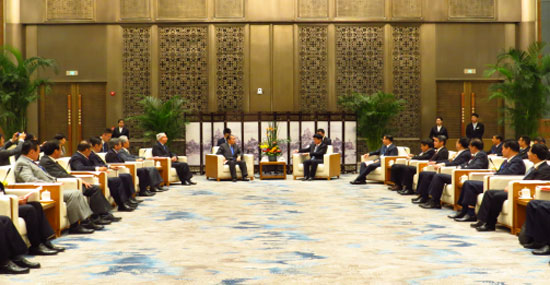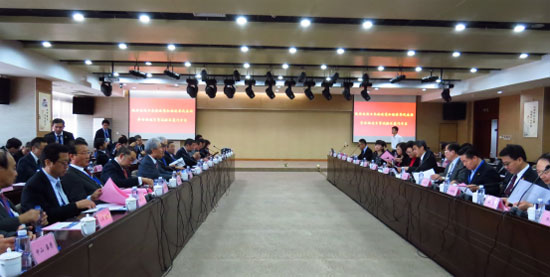
The delegation also visited the Xiamen area of the China (Fujian) Pilot Free Trade Zone and attended a symposium.

Pei Jinjia, secretary of the Xiamen Municipal Committee of the CPC, meets with the delegation on Dec 24, 2017. [Photo/en.xmfo.gov.cn]
Chen Min, deputy head of the administration of the zone, said that with the development of the zone, Xiamen is growing into a gateway under the Belt and Road Initiative. As a strategic pivot city in the implementation of the initiative and the starting point of the ancient Maritime Silk Road, Xiamen will intensify its opening-up to attract more foreign-funded enterprises from countries including Japan to invest and start businesses in the city, according to Chen.
Cai Liqun, vice general manager of Xiamen Port Holding Group, said that in 2017 Xiamen's container throughput is expected to reach 10 million twenty-foot-equivalent units (TEUs). The container throughput to Japan is expected to reach 280,000 TEUs, which will signify a steady growth. Cai also expressed his hope for more economic and trade cooperation between Xiamen and Japan.
Sadayuki said that Japan's economic circles are willing to work closely with the Japanese government to actively participate in the Belt and Road Initiative, and cooperate with Chinese enterprises in a variety of fields, including industrial cooperation and infrastructure construction.

Japanese delegation takes part in a symposium at the Xiamen area of the China (Fujian) Pilot Free Trade Zone during their visit in Xiamen on Dec 25, 2017. [Photo/en.xmfo.gov.cn]
China has launched a new pilot program to allow eligible enterprises greater access to overseas financing in support of green and low-carbon transformation projects, the country's foreign exchange regulator said on Aug 21.
To further streamline the experience, China is expanding tax refund stores, broadening the range of refundable goods, and refining refund procedures, ensuring an efficient and seamless shopping experience for global visitors.